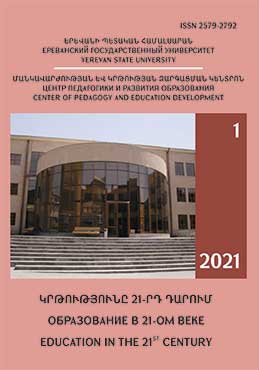ЭТАПЫ ФОРМИРОВАНИЯ БАЗОВЫХ ПОНЯТИЙ ДИСТАНЦИОННОГО ОБУЧЕНИЯ
DOI:
https://doi.org/10.46991/educ-21st-century.v1i5.10712Ключевые слова:
Ключевые слова: дистанционное обучение; дистанционное образование; электронное образова-ние; смешанное обучение, образовательные реформы; инновационное образование; образовательные программы; национальное образование; учреждение высшего образования; информационно-коммуникационные технологии.Аннотация
В статье проанализированы исторические этапы формирования базовых понятий дистан-ционного обучения (корреспондентское обучение, обучение на расстоянии). Рассмотрены теорети-ческие аспекты развития дистанционного образования в Украине. На основании анализа научных источников систематизированы толкования ключевых понятий дистанционного образования и дис-танционного обучения. Акцентировано внимание на том, что современное понимание понятий и терминов дистанционного обучения основывается на его толковании как деятельности с использо-ванием интернет-технологий и ресурсов. Проведено сравнение понятий дистанционного образования (distance education) и дистанционного обучения (distance learning), а также смежных понятий «открытое образование» и «смешанное обучение».
Ключевые слова: дистанционное обучение; дистанционное образование; электронное образова-ние; смешанное обучение, образовательные реформы; инновационное образование; образовательные программы; национальное образование; учреждение высшего образования; информационно-коммуникационные технологии.
Библиографические ссылки
On Higher Education: Law of Ukraine of July 1, 2014 № 1556-VII. Retrieved from https://zakon.rada.gov.ua/laws/show/1556-18#Text.
The concept of development of distance education in Ukraine (approved by the Resolution of the Ministry of Education and Science of Ukraine on December 20, 2000). Retrieved from https://docs.google.com/viewer.
On approval of the Regulations on distance learning: Order of the Ministry of Education and Science of Ukraine of April 25, 2013 № 466 (as amended), Retrieved from https://zakon.ra-da.gov.ua/laws/show/z0703-13 Text.
Zhevakina, N.V. Pedagogical conditions of the organization of distance learning of students of humanitarian specialties in pedagogical university: Abstract of PhD Dissertation. Lugansk, 2009. 20 p.
Vyshnivsky, V.V., Gnidenko, M.P., Gaidur, G.I., Ilyin, O.O. Organization of distance learning. Creation of electronic training courses and electronic tests: Manual. Kyiv: DUT, 2014. 140 p.
Keegan, D. & Rumble, G. Distance teaching at university level // The Distance Teaching Universities. London: Croom Helm, 1982.
On Education: Law of Ukraine of September 5, 2017 № 2145-VIII. Retrieved from https://zakon.rada.gov.ua/laws/show/2145-19#Text.
Organization of Distance Learning in School: Methodological Recommendations. Retrieved from https://mon.gov.ua/storage/app/media/zagalna%20serednya/metodichni%20recomendazii/2020/metodichni%20recomendazii-dustanciyna%20osvita-2020.pdf.
Robert, I.V. Theory and methods of informatization of education (psychological, pedagogical and technological aspects). 2nd edition, supplemented: monograph. Moscow: IIE RAE. 2008. 274 p.
Polat, E.S., Bukharkina, M.Yu., Moiseeva, M.V., Petrov, A.E. New pedagogical and information technologies in the education system: a textbook for students of higher educational institutions / Ed. E.S. Polat. – 4th ed., erased. – Moscow: Publishing Center «Academy», 2009. –272 p.
Khutorskaya, A. V. Workshop on didactics and modern teaching methods. SPb.: Piter, 2004. 541 p.
On approval of the Regulations on distance learning: Order of Ministry of Education and Science of Ukraine of 25.04.2013 № 466. Retrieved from https: //zakon4.rada.gov.ua/laws/show/z0703-13.
Bykov, V. Yu. Models of organizational systems of open education. Кyiv: Attica, 2009. 684 p.
The concept of development of distance education in Ukraine of the year: Resolution of Ministry of Education and Science of Ukraine of December 20, 2000. Retrieved from https://www.osvita.org.ua/distan-ce/pravo/00.html.8.
Open education: the latest technologies in the educational process and educational management as a means of intensifying the development of the educational and scientific system of Ukraine: Analytical note / National Institute for Strategic Studies: Humanitarian Development, 2012. Retrieved from https://www.niss.gov.ua/articles/721/.
Iiyoshi T. & Vijay Kumar M.S. Opening Up Education // The Collective Advancement of Education through Open Technology, Open Content and Open Knowledge. London, The MIT Press, 2009. – 256 p.
Regulations on electronic educational resources. Retrieved from https://zakon2.rada.gov.ua/laws/show/z1695-12n13.
Fedorchuk, M.V. The essence and state of implementation of electronic education in Ukraine // Law and security. 2015. №4. P. 61– 66.
Rosenberg, M. Beyond E-Learning: New Approaches to Managing and Delivering Organizational Knowledge // ASTD International Conference, June 3. Atlanta, 2007.
Chugai, O. Yu. Mixed or hybrid learning as a transformation of the traditional educational model // Latest Educational Technologies in the Context of European Integration: X International Scientific and Practical Conference. 2015. Retrieved from https://confesp.fl.kpi.ua/node/1268.
Kukharenko, V. M. System approach to blended learning // Information technologies in education. 2015. № 24. P. 5367. DOI: 10.14308 / ite000568.
Загрузки
Опубликован
Как цитировать
Выпуск
Раздел
Лицензия

Это произведение доступно по лицензии Creative Commons «Attribution-NonCommercial» («Атрибуция — Некоммерческое использование») 4.0 Всемирная.

